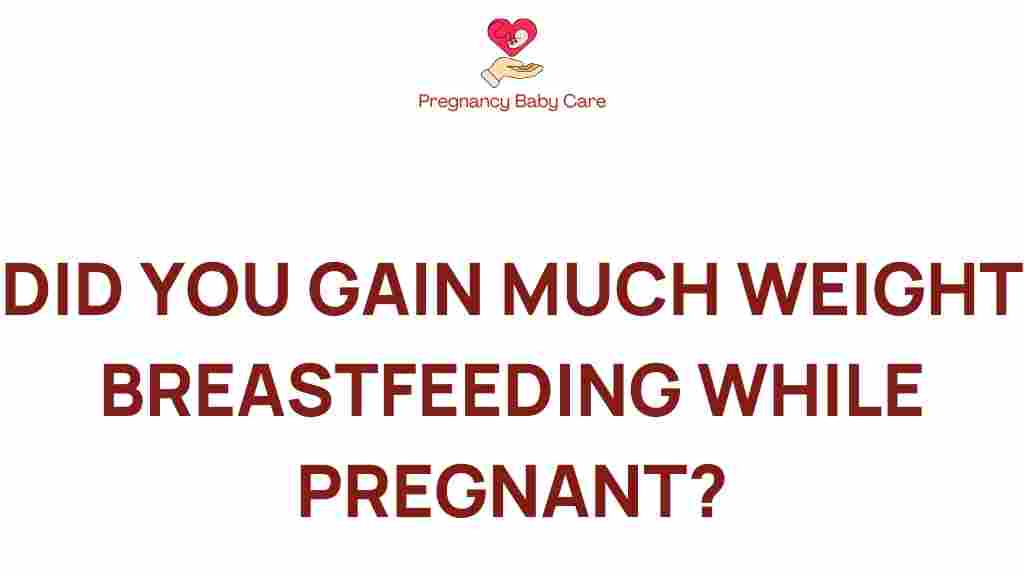The Weighty Question: Did Breastfeeding During Pregnancy Impact Your Weight?
Breastfeeding during pregnancy is a topic that has garnered much attention in recent years. Many expectant mothers wonder how this practice might affect their weight gain and overall maternal health. Exploring this subject reveals a complex interplay of nutrition, weight management, and infant care. In this article, we’ll dive deep into the implications of breastfeeding during pregnancy and its potential impact on weight, maternal health, and postpartum recovery.
Understanding Breastfeeding and Pregnancy
Breastfeeding is the natural process of feeding an infant with milk produced by the mother’s body. During pregnancy, mothers undergo significant physiological changes, and those who choose to continue breastfeeding often have unique experiences. Here, we’ll discuss how breastfeeding during pregnancy might influence weight gain and maternal health.
How Breastfeeding Affects Weight Gain During Pregnancy
When a mother continues to breastfeed while pregnant, her body is essentially working to support two lives. This can lead to various outcomes regarding weight gain:
- Increased Caloric Needs: Pregnant women generally need more calories, especially if they are breastfeeding. The additional energy expenditure can affect weight gain.
- Metabolism Boost: Breastfeeding can enhance metabolism, potentially leading to less weight gain during pregnancy.
- Nutritional Demands: Mothers must ensure they are meeting nutritional needs for both themselves and their developing fetus, which can influence overall weight management.
Nutrition Considerations for Breastfeeding Mothers
Proper nutrition is vital for mothers who are breastfeeding during pregnancy. The following guidelines can help ensure both maternal health and optimal infant care:
- Balanced Diet: A well-rounded diet rich in fruits, vegetables, whole grains, lean proteins, and healthy fats is essential.
- Stay Hydrated: Increased fluid intake is necessary to support milk production and overall health.
- Supplements: Consider prenatal vitamins and minerals, such as folic acid and calcium, to meet increased nutritional demands.
Weight Management Strategies During Pregnancy
Weight management can be particularly challenging for breastfeeding mothers. Here are effective strategies to help manage weight gain while ensuring maternal and infant health:
- Monitor Caloric Intake: Track your daily caloric intake to ensure you are meeting, but not exceeding, your energy needs.
- Regular Exercise: Engage in light to moderate exercise, as advised by your healthcare provider, to maintain fitness and support weight management.
- Mindful Eating: Pay attention to hunger cues and practice portion control to avoid unnecessary weight gain.
Postpartum Considerations
The postpartum period is critical for mothers who have breastfed during pregnancy. Understanding the potential effects on weight can help in recovery:
- Weight Loss: Breastfeeding can aid in postpartum weight loss, as it burns extra calories.
- Emotional Health: Weight management can often be linked to mental well-being; thus, focusing on maternal health is essential.
- Support Systems: Engage with family and healthcare professionals for support in managing weight and health post-birth.
Breastfeeding Benefits Beyond Weight Management
While the focus of this article is on weight, the benefits of breastfeeding extend far beyond just maternal weight management:
- Enhanced Bonding: Breastfeeding fosters a close emotional connection between mother and child.
- Infant Health: Breast milk provides essential nutrients and antibodies, boosting the infant’s immune system.
- Long-term Health Benefits: Studies suggest that breastfeeding may reduce the risk of chronic diseases in both mother and child.
Troubleshooting Common Concerns
Breastfeeding during pregnancy can come with its challenges. Here are some common concerns and troubleshooting tips:
- Decreased Milk Supply: As pregnancy progresses, some mothers may notice a decline in milk supply. Ensure adequate hydration and nutrition to help maintain milk production.
- Fatigue: Managing breastfeeding and pregnancy can be exhausting. Prioritize rest and enlist support from family and friends.
- Nipple Sensitivity: Increased sensitivity may occur; consider using lanolin cream for comfort.
Consulting with Healthcare Professionals
It’s crucial to discuss your specific situation with a healthcare provider, especially regarding weight management and breastfeeding during pregnancy. They can provide personalized advice and resources. For more information on maternal health, you can visit the CDC’s nutrition page.
Conclusion
The question of whether breastfeeding during pregnancy impacts weight is multifaceted. While it can influence weight gain and management, the benefits of breastfeeding for maternal and infant health are profound. By focusing on nutrition, regular exercise, and proper support, mothers can navigate this unique phase effectively. Ultimately, understanding the balance between breastfeeding, pregnancy, and weight will empower mothers to make informed choices for themselves and their children.
For further insights into infant care and breastfeeding benefits, check out our detailed guide here.
This article is in the category Pregnancy and created by PregnancyBabyCare Team
